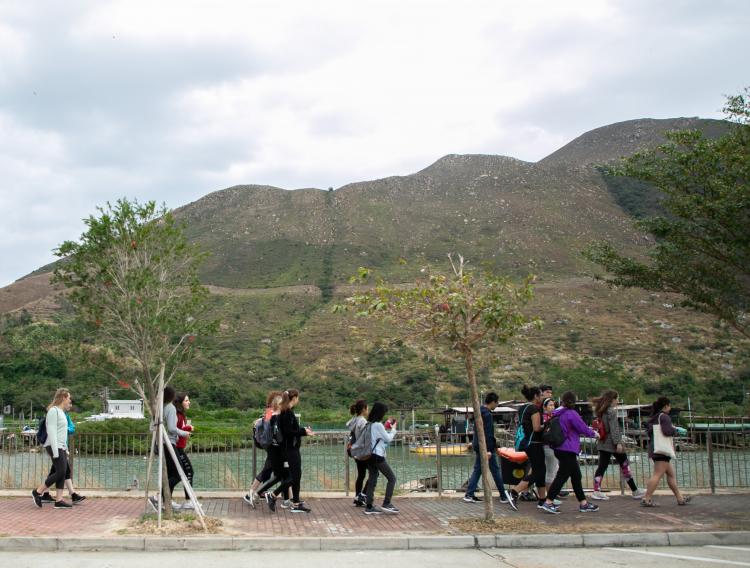COUNSELING
You are encouraged to consult professional counselors, who are available on campus, should you experience any of the following:

Emotional instability, depression or anxiety

Interpersonal tension or conflict

Maladjustment to University or campus life

Unsatisfactory academic performance

Alcohol and/or drug abuse

Eating disorders
FAITH & RELIGION
Religious freedom is protected and guaranteed under Hong Kong’s Basic Law. While most of Hong Kong’s ethnic Chinese adhere to traditional Chinese faiths such as Buddhism and Taoism, there are numerous other religions in the territory that contribute to its cultural diversity. These include Christianity, Islam, Hinduism and Judaism, amongst many others.
The below places of worship are the closest locations to HKUST for the respective faiths:
Buddhism: Chi Lin Nunnery
Catholicism: St. Vincent’s Church
Christianity: Clearwater Bay International Baptist Church
Hinduism: Happy Valley Hindu Temple
Islam: Kowloon Mosque (Masjid) and Islamic Centre
Judaism: Ohel Leah Synagogue
Taoism/Buddhism/Confucianism: Wong Tai Sin Temple
DIET-SPECIFIC INFORMATION
Being able to adhere to diet-specific preferences or needs is an important part of staying physically and mentally well when you are living in a new environment. While it may take some time for you to adjust to what is available for your dietary needs in Hong Kong, it is possible as long as you give it a little effort and are open to a little bit of compromise.

Halal-certified foods
Halal certification is granted through the Incorporated Trustees of the Islamic Community Fund of Hong Kong. Click here to view a list of the certified restaurants published by the Hong Kong Tourism Board.

Kosher
The Va’ad Hakashrut of Hong Kong (VHHK) supervises the strict kashrut of the Jewish Community Center, including the restaurant and the Koshermart. Click here for more information from the Jewish Community Centre of Hong Kong.
FOOD ALLERGIES / INTOLERANCE
The best way to avoid an allergic reaction to food is to avoid that food. Ask the food provider about the ingredients used to make the dish, review the ingredient labels on packaged foods, or eat only what you prepare yourself.
If your food allergies or intolerance can lead to life threatening symptoms, we advise you to be vigilant when eating out, as the possibilities of cross contamination in food preparation facilities can sometimes be unavoidable. In addition, you should be aware that different countries have different food labeling laws, which may require products to list only the major items or not require them to list any ingredients altogether.
When traveling to a place where you are unfamiliar with the local language, you should carry a card with you that describes your food allergy/intolerance and its resultant symptoms. This card should be in the local language, so that it can be shown to eateries to clearly communicate the details and severity of your allergy/intolerance.
ALCOHOL
While social drinking is acceptable, we strongly discourage excessive drinking to the point where it impairs your judgment.
The legal drinking age in Hong Kong is 18. Premises serving alcohol may perform ID checks. In such cases, you will have to provide a government-issued identity card stating clearly your date of birth, such as your passport or HKID.
SMOKING
Smoking is hazardous to your health. Hong Kong law prohibits smoking in most enclosed areas, including restaurants, karaoke boxes, malls and some bars; as well as in most public outdoor areas, including public beaches, swimming pools, transport interchanges, escalators and university campuses. As such, HKUST is a non-smoking campus.
Any person who smokes or carries a lighted tobacco product in a statutory non-smoking area will be fined up to HK$1,500.
For more information on the policy of non-smoking campus, please click here.
NARCOTICS
Hong Kong laws regarding the enforcement and penalties for narcotics may be different from that of other countries. You should pay attention to these. In Hong Kong, the below are considered offences and are liable for conviction:

Trafficking a dangerous drug (includes selling or distributing a drug)

Manufacturing a dangerous drug

In possession of, or smoking, inhaling, ingesting or injecting a dangerous drug

In possession of any pipe, equipment or apparatus fit and intended for smoking, inhaling, ingesting or injecting a dangerous drug

Cultivating any plant of the genus cannabis or opium poppy
SEXUAL ASSAULT / HARASSMENT
What is Sexual Assault?
Sexual assault refers to unwanted assault of a sexual nature on another person, including kissing, touching, molestation, and rape. Sexual assaults, whether on or off campus, is a criminal offence, and you should report the offence to the police immediately.
There are some tips to reduce the risk of sexual assault, including the following:

Communicating clearly your limits concerning any aspects of sexual behavior, including touching, kissing and sexual intercourse. You should reject any sexual behavior or advances that you are not comfortable with.

When traveling outside of Hong Kong, consider going with someone you trust.

Avoid excessive intake of alcohol and/or drugs, or substances that may impair judgment. Watch your drinks at all times; drugging can be a problem anywhere.
What is Sexual Harassment?
Unwanted sexual advances, requests for sexual favors, and other verbal or physical conduct of a sexual nature constitute sexual harassment when:

Any aspect of your educational experience is made conditional on submission to such conduct, either explicitly or implicitly, or

Educational decisions affecting you are based on rejection of such conduct, or

Such conduct has the purpose or effect of:

Unreasonably interfering with an individual’s work performance or educational experience, or

Creating an intimidating, hostile, or offensive working or learning environment.
Sexual harassment is prohibited under the University policy. University faculty, staff or students are liable to disciplinary actions if found guilty of sexual harassment.
What can you do about Sexual Harassment?

Maintain a record of the events, behavior, witnesses as well as your reactions and feelings about any incidents that occurred. Many people confronted with unwanted sexual behavior experience a range of feelings from self-doubt and self-blame to depression and anger.

Report the behavior and seek an advocate such as your supervisor, a student counselor or Residence Master, or any other supervisory personnel with whom you feel comfortable with and may provide advice, support to you, and act as an informal mediator between you and the offender.

Report the behavior to the Gender Equity Officer (GEO), and follow the University complaint resolution procedure from then on.
What is the University Complaint Procedure?

Attempts to resolve problems or conflicts should be sought informally. However, if these informal means fail to resolve a situation, or if you feel that only a formal complaint can provide relief, you may do so under the University Complaint Procedure.

File a formal complaint with the GEO. The GEO will investigate the complaint, establish merits and initiate the mediation process by recommending a settlement with the intent to provide a remedy for the complaint.

If either party is not satisfied with the results from the following steps, the GEO will initiate a formal hearing into the complaint.
For further information, please refer to the University Policy on Sexual Harassment.







